At St Katherine’s School we are committed to keeping you safe. The member of staff in charge of child protection and safeguarding is Katharine Crocker. She is the Designated Safeguarding Lead.
Sometimes adults hurt children or make them feel bad or afraid. This should not happen – but if it happens to you, we are here to help you.
Below are some examples of abuse that young people may experience, if any of these acts are happening to you, please talk to a member of staff:
-
Physical abuse – when an adult deliberately hurts a child, such as hitting, shaking, throwing, poisoning, burning, drowning or suffocating.
-
Neglect – where a child is not being looked after properly, for example, not getting enough to eat or being left alone in dangerous situations.
-
Emotional abuse – when a child is continuously blamed for everything, or told they are stupid and made to feel unhappy.
-
Sexual abuse – where a child has been forced to take part in sexual activities or in the taking of rude photos.
-
Bullying and cyberbullying
-
Teenage relationship abuse
-
Gangs and youth violence
You can talk to any member of staff about anything that you are worried or concerned about.
Sometimes children hurt one another. In school we call this peer-on-peer abuse. Below are some examples of peer-on-peer abuse that young people might experience. If any of these are happening to you or someone you know, please talk to a member of staff or report it using our online bullying reporting form.
-
bullying (including cyberbullying)
-
physical abuse such as hitting, kicking, shaking, biting, hair pulling, or otherwise causing physical harm
-
sexual violence and sexual harassment
-
initiation/hazing rituals.
Please remember you can talk to any member of staff about anything that you are worried or concerned about.
Online Safety
The following bullet points are intended as a guide to protect you whilst using computers and the internet:
-
Only use the school’s computers for schoolwork and homework.
-
Only delete your own files.
-
Do not look at other people’s files without their permission.
-
Keep your login and password secret.
-
Do not bring files into school without permission.
-
Ask permission from a member of staff before using the Internet and do not visit Internet sites you know to be banned by the school.
-
Only e-mail people you know, or that your teacher has approved.
-
The messages you send, or information you upload, must always be polite and sensible.
-
Do not open an attachment, or download a file, unless you have permission or know and trust the person who has sent it.
-
Do not give your home address, phone number, send a photograph or video, or give any other personal information that could be used to identify you, your family or your friends, unless your teacher has given permission.
-
Never arrange to meet someone you have only ever previously met on the Internet or by email, unless your parent, guardian or teacher has given permission and take a responsible adult with you.
If you see anything you are unhappy with or you receive a message you do not like, do not respond to it but do tell a teacher / responsible adult.
If you have got yourself into an awkward situation, and you need to help to sort it out, speak to Mrs Crocker.
Advice on how to keep yourself safe online can be found at:
Advice for parents on how to support their children to be safe online can be found at:
https://parentzone.org.uk/home
Please remember you can talk to any member of staff about anything that you are worried or concerned about.

